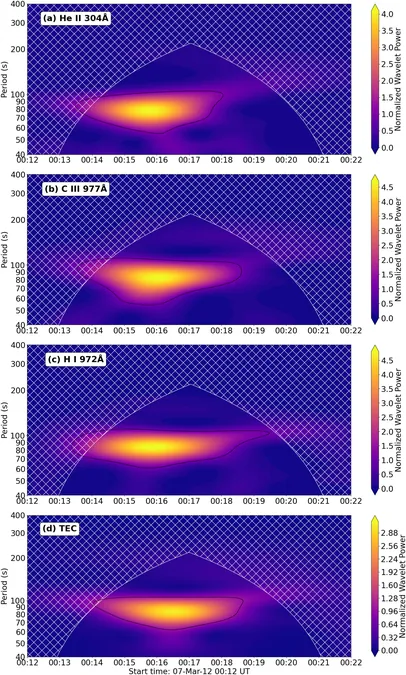
Solar Explosions Resonate with Earth's Atmosphere: New Insights into Solar Flare Effects
2025-04-28
Author: Jia
A Shocking Revelation About Solar Flares
New research from Queen's University Belfast has unveiled a surprising fact: our atmosphere is far more responsive to the sun's explosive energy than scientists previously thought. This breakthrough knowledge could have substantial implications for technology reliant on accurate measurements.
The Powerful Impact of Solar Flares
Solar flares, the intense bursts of energy generated by magnetic field fluctuations on the sun, occur frequently and can wreak havoc on Earth. These powerful outbursts can distort GPS systems and, in extreme instances, lead to total radio blackouts, cutting off all signals.
Groundbreaking Research on Solar Activity
Focusing on a notable solar flare from 2012, researchers have discovered that the rhythmic pulses emitted by this flare resonate in perfect sync with responses from our atmosphere. This significant finding, published in the Journal of Geophysical Research: Space Physics, highlights a new layer of complexity in the Earth-sun relationship.
Lead researcher Aisling O’Hare, a Ph.D. student at Queen’s, explains, "We used a space-based satellite to track the sun's rhythmic pulses occurring every 90 seconds. Meanwhile, our analysis involving GPS satellites and ground receivers revealed that the atmosphere responded with its own pulses just 30 seconds later. This synchronization is crucial to understanding solar dynamics."
Close to Home: Implications for Our Daily Lives
As we are currently in the solar maximum phase of the sun's 11-year cycle, solar flares are striking nearly every day. This study shines a spotlight on the profound effects these events can have on our planet, making it essential to grasp their potential impact on communication systems and satellite trajectories.
Rapid Response: The Atmosphere Reacts Quickly
The research revealed that atmospheric pulsations follow closely behind solar flare pulses, indicating that any significant solar event could produce noticeable effects on Earth within a mere 30 seconds. This rapid response time is crucial for scientists and engineers working on technological solutions.
Continuing Exploration of Solar-Earth Interactions
Dr. Ryan Milligan, O'Hare's supervisor at Queen's, expressed excitement over the findings, stating, "This research underscores just how sensitive our atmosphere is to the sun's fluctuations. Understanding what instigates these atmospheric pulsations remains a mystery, but Aisling's work contributes greatly to unraveling the complex relationship between the Earth and the sun."
The ongoing exploration of Earth-sun interactions not only deepens our understanding of space weather but also equips us to better prepare for future solar impacts.


 Brasil (PT)
Brasil (PT)
 Canada (EN)
Canada (EN)
 Chile (ES)
Chile (ES)
 Česko (CS)
Česko (CS)
 대한민국 (KO)
대한민국 (KO)
 España (ES)
España (ES)
 France (FR)
France (FR)
 Hong Kong (EN)
Hong Kong (EN)
 Italia (IT)
Italia (IT)
 日本 (JA)
日本 (JA)
 Magyarország (HU)
Magyarország (HU)
 Norge (NO)
Norge (NO)
 Polska (PL)
Polska (PL)
 Schweiz (DE)
Schweiz (DE)
 Singapore (EN)
Singapore (EN)
 Sverige (SV)
Sverige (SV)
 Suomi (FI)
Suomi (FI)
 Türkiye (TR)
Türkiye (TR)
 الإمارات العربية المتحدة (AR)
الإمارات العربية المتحدة (AR)